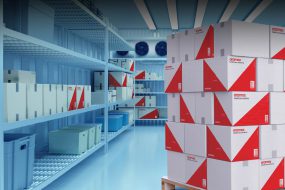For those who work in the healthcare space, logistics isn’t just about trucks and tracking numbers – it can be the difference between life and death. Whether it’s getting vaccines to remote clinics or ensuring a hospital never runs out of surgical gloves, logistics is quietly working behind the scenes to keep the entire system running.
Let’s take a closer look at how a greathealthcare logistics providercan revolutionise care, where the significant challenges lie, and what the future might hold for this vital industry.
Related reading:Reinventing medical logistics for better outcomes
It’s more than just moving boxes
Logistics for healthcare isn’t just about shifting supplies around. It’s about ensuring that the right items reach the right place at the right time, in perfect condition, every single time.
We’re talking:
- Temperature-controlled medicines that can’t survive an hour without proper cooling
- Fragile equipment that needs careful handling
- Emergency stock deliveries where every minute matters
A reliablehealthcare logisticssolution ensures that shelves are stocked, surgeries are prepped, and patients are cared for with zero margin for error.
No room for delays
In most industries, a late delivery is annoying. In healthcare, it could be dangerous. Delays in medical deliveries can disrupt treatment, stall surgeries, or even put lives at risk. That’s why logistics in this sector has to be watertight. That means fast, accurate, and ultra-dependable.
A good healthcare logistics provider doesn’t just deliver; it also ensures quality and reliability. They plan, predict, and prevent problems before they happen. Think of them as the unsung heroes of healthcare.
Related reading:How innovative logistics services are transforming patient care in healthcare
So, why is it so complicated?
Because healthcare logistics is a beast. You’re juggling:
- Temperature-sensitive items
- Strict expiry dates
- Regulatory hurdles
- Sudden spikes in demand (hello, global pandemics)
Additionally, everything needs to be tracked, traced, and comply with various rules in each region. It’s not exactly your average delivery job.
Related reading:Why cold chain tech is critical to patient safety
Tech to the rescue: Innovations changing the game
Luckily, technology has been making its presence felt in the healthcare logistics world. Here’s what’s making waves:
Multimodal transport
Sometimes, the fastest way from A to B is by mixing it up. Utilising planes, trucks, and even bikes in a single delivery route can significantly reduce delivery times and costs, especially when speed is crucial.
Blockchain for authenticity
Fake meds are a real threat. Blockchain tech creates an unchangeable record of every product’s journey, making it easier to prove that what arrives is 100% legit.
Automation and AI
Automation handles inventory. AI predicts demand. Together, they make sure no one runs out of insulin or emergency blood bags. Smart systems can even reroute deliveries based on real-time traffic.
But it’s not all smooth sailing
Despite all this innovation, healthcare logistics still faces some serious challenges.
Regulation overload
Rules, rules, and more rules. They vary by country, product, and sometimes even by region. One misstep can lead to fines, delays, or worse – putting patients at risk.
Keeping costs in check
Healthcare budgets are tight, but cutting corners on logistics can ultimately prove more costly in the long run. Providers are always walking a tightrope between keeping costs low and maintaining high service levels.
Planning for the unexpected
Disasters, strikes, political chaos – you name it, you’ll have to face it. A good logistics plan includes a backup for the backup. Risk management is crucial in maintaining the smooth operation of the supply chain.
Related reading:How to achieve seamless global shipping in healthcare logistics
Turning challenges into opportunities
It’s not all doom and gloom. Smart logistics providers are using these challenges as fuel for innovation.
Going circular
Sustainability is no longer a ‘nice-to-have’; it’s a must-have. Applying circular economy principles (such as reusing packaging or optimising delivery routes) reduces waste and costs.
Partnering up
Collaboration is the name of the game. When healthcare providers, logistics companies, and tech experts collaborate, they create smarter, more agile systems that better serve patients.
Smarter data, smarter decisions
Data analytics is changing the game. Tracking every item, every movement and every demand spike provides providers with the insights they need to plan smarter and react faster.
Key takeaway: The future of healthcare logistics is agile, innovative, and seriously cool
What used to be a behind-the-scenes function is now centre stage. Logistics is powering better care, faster responses, and smarter systems. It’s the backbone of healthcare, and it’s only getting stronger.
Whether you’re a hospital manager, a startup founder in MedTech, or just someone curious about how the system ticks, now’s the time to pay attention.
By leveraging smart technology, strong partnerships, and effective logistics strategies, you can maintain a smooth operation of healthcare supply chains and ensure patients receive proper care.
Want to see how we can support your healthcare logistics? Let’s chat.Get in touch today.




